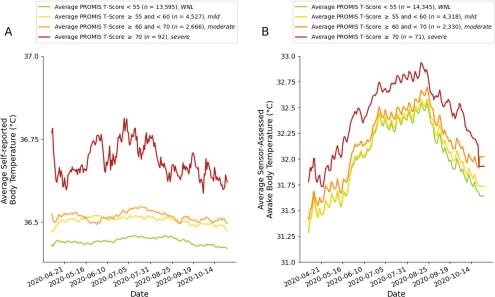With support from USAMRDC’s Military Infectious Diseases Research Program (MIDRP), Military Operational Medicine Research Program (MOMRP), and MTEC, researchers at the University of California San Fransico and the University of California San Diego showed a correlation between higher depressive symptoms and higher body temperatures, a finding that supports nascent research suggesting that thermal interventions may be a new treatment avenue for people who struggle with depression.
In 2020, UCSF Principal Investigator Dr. Ashley Mason and her colleague UCSD Co-Investigator Dr. Benjamin Smarr launched the TemPredict Study, which enrolled over 20,000 participants to provide ambulatory data from a wearable device, Oura Ring, and to self-report on their mental and physical health symptoms. Oura Ring assesses physiological metrics including distal body temperature, heart rate, heart rate variability, and respiration rate. This sample includes participants who possessed an Oura Ring prior to joining the study (the majority of participants) as well as healthcare workers to whom TemPredict provided an Oura Ring. The current findings are a continuation of the work Drs. Mason and Smarr started to identify COVID-19 infection utilizing physiological data from Oura Ring.
Researcher at UCSF and UCSD have published 3 significant journal articles in the past year from work generated under their MTEC award. The conclusions drawn from the three journal articles underscore the significant potential of wearable technology, specifically the Oura Ring, in enhancing health monitoring and personalized interventions. The studies highlight how the Oura Ring’s data on sleep, activity, and heart rate variability can provide critical insights for improving individual health outcomes. Furthermore, they advocate for integrating such data into clinical practices to support tailored health strategies. Ultimately, the research suggests that combining wearable health data with strategic funding can drive transformative changes in healthcare delivery and personalized medicine.
This work has been recently published in the Scientific Reports, Nature Publishing, Digital Medicine, and Frontiers in Network Physiology. This effort was funded under MTEC solicitation MTEC-20-12-Diagnostics-023 and the USAMRDC under the Department of Defense (#MTEC-20-12-COVID19-D.-023). The #StartSmall foundation (#7029991), and Oura Health Oy (#134650) also provided funding for this work. The views and conclusions contained herein are those of the authors and should not be interpreted as necessarily representing the official policies or endorsements, either expressed or implied, of the U.S. Government.

About University of California:
The laboratories of Ashley E. Mason, PhD (University of California San Francisco) and Benjamin L. Smarr, PhD (University of California San Diego) collaborated on this work. Ashley E. Mason, PhD, is an Associate Professor of Psychiatry at UCSF. She is core research faculty at the UCSF Osher Center for Integrative Health. She is Director of the UCSF Sleep, Affect, and Eating (SEA) Lab and is the Co-Director of the UCSF Center for Obesity Assessment, Study, and Treatment (COAST). She is also a clinical psychologist and leads behavioral sleep medicine treatment in the UCSF Osher Center Clinic. Benjamin L. Smarr, PhD is an Assistant Professor at the Halicioğlu Data Science Institute and the Department of Bioengineering at the University of California, San Diego. As an NIH fellow at UC Berkeley, he developed techniques for extracting health and performance predictors from repeated, longitudinal physiological measurements.




